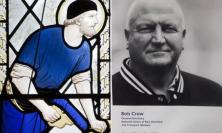There are very few people whose working lives have not been altered in some way over the course of the Covid-19 pandemic, and in many cases that will also have led to a change in the way work is valued and understood. What does work mean to you, and what do you think it means to a creator God? Charles Hippsley invites us to consider these questions when we celebrate the feast of St Joseph the Worker on 1 May.
How do you think about work? Is it just a way of putting food on the table and paying the rent? Are you in paid work, or perhaps volunteering, or focusing on raising a family at home? How has Covid-19 changed the way you value work? We’ve all come to appreciate what frontline workers – teachers, doctors, nurses, shopworkers, delivery people – do in this past year. How about your work: do you think it matters?
With those questions in mind, let’s look briefly at what the Bible has to say about work. As we go, we’ll pick up on three strands, three questions that Christians often ask about work. How does work fit in with God’s purposes? Why is work sometimes so hard? And what does it mean to follow Jesus in my work?
Our work and God’s purposes
Let’s look first at our work in the context of God’s purposes by considering God’s work of creation. There are two accounts of creation in Genesis 1 and 2, which speak of God’s intention to delegate to humankind the cultivation of God’s creation. For example:
Then God said, ‘Let us make mankind in our image, in our likeness, so that they may rule over the fish in the sea and the birds in the sky, over the livestock and all the wild animals, and over all the creatures that move along the ground.’ (Genesis 1:26 [all quotations: NIV])
At the time Genesis was written, that meant the building of families, the growing of crops and the breeding of animals: the tending of the garden. And we echo those early tasks in our 21st century jobs in which we work to develop culture and civilisation: building houses, designing clothes, running businesses, writing code, teaching children. Work is not the result of sin; it’s in our DNA. It’s a big part of why we’re here. And it’s important to God!
Genesis also reveals a God who is present with us, a God who enjoys relationship with God’s created beings as they work, a God who is intensely interested in the work we do. So, for example, after God had made the animals, God brought them to Adam to see what he would name them.
Now the Lord God had formed out of the ground all the wild animals and all the birds in the sky. He brought them to the man to see what he would name them; and whatever the man called each living creature, that was its name. (Gen 2:19)
God clearly delegates this job to Adam. When Adam comes up with a strange name like ‘elephant’, God doesn’t say: ‘Elephant? I don’t think so! Let me take over.’ No – that was its name, because Adam was given authority from God to do the work of naming, and remained accountable for that task.
There’s much more that could be said, but from these early accounts we can see that work has instrumental value and relational value. Instrumental value in that doing God’s work helps to provide what we and others need in order to flourish: it gets what God wants doing, done. And relational value in that we’re intended to enjoy work in community, with God and with each other. So the work we do day-to-day is important to God and a key way of fulfilling our call to God.
When God worked at creation, it was with a set of clear purposes: bringing order out of chaos, creating beauty in God’s amazing universe, making provision, imparting joy to God’s creatures and Godself, and releasing potential. Through that work, God created a context for human flourishing.
If we want to see how our daily work reflects God’s character and how we’re serving God through it, we can ask: ‘How does my work do what God did? How does what I do day by day bring order out of chaos, create beauty in this amazing world, provide for me and others, impart joy, or release potential? How do I help to create a context for human flourishing?’
So many of us do any or all of those things, but find it hard to see. Think for a moment about how a teacher helps a class to unlock their potential; how a parent offers a place of love and safety, and adds careful boundaries to help their child grow well; how an architect designs stunningly creative and beautiful buildings; or how an IT engineer helps me to communicate well by fixing my WiFi connection. What misery when it’s not working but what joy when I get my internet back again!
Even if we’re small cogs in big organisations, we can learn to bring creativity to bear in a way that gets God’s work done. For example, one person might design a form that’s easy for the rest of us to use; another might build a washing machine that uses less water; or perhaps they work in a call centre and treat their 25th caller of the day with the same helpfulness and respect as their first.
And what about you? How does your work help others? If you’re struggling, ask God to show you, or ask a friend or colleague what they see in the work that you do.
Why is work sometimes so hard?
All this helps us to see why work matters to God. But if that’s the case, why is it sometimes so hard? Moving on in Genesis, it’s not difficult to find the answer. We read in Genesis 3 that God’s original intent for humankind, including work, was marred by our self-interest. And that damaged many of the relationships we enjoyed: with God, with each other, with our work, and with all of creation. We turned ‘how can I serve God and others through my work’ into ‘how can I serve myself’? And so work became toil.
Cursed is the ground because of you; through painful toil you will eat food from it all the days of your life. (Gen 3:17)
The impact of our fallenness and the destructive work of our enemy shows itself in the workplace as much as any other human context. And the Bible is realistic about the fallen nature of work. You only have to look, for example, at the Tower of Babel in Genesis 11:1-9 to see people working to establish a power and authority for themselves independent from God. Or at the way work was used as a punishment and a reminder of slave status in Exodus 5:7-9 – the people of Israel being ordered to find their own straw to make bricks without dropping the speed of production.
You’ll probably come across people in your communities who struggle with work – the brokenness of work itself or the impact that a toxic work environment can have on them. You might be struggling with either or both of these yourself. But God didn’t forget work: Paul tells us in Colossians 1 that Christ’s redeeming work on the cross restores right relationship with God for all things, and that must include work. He offers hope for individuals struggling with work and hope for the world through work that brings restoration and healing.
For God was pleased to have all his fullness dwell in him, and through him to reconcile to himself all things, whether things on earth or things in heaven, by making peace through his blood, shed on the cross. (Colossians 1:19-20)
Later on in Colossians, Paul talks to household slaves. If anybody has a tough job, these people certainly did. Theirs was not a dream career. They’d been dragged into slavery as the spoils of war or been forced to sell themselves in order to survive. And yet Paul says this:
Whatever you do, work at it with all your heart, as working for the Lord, not for human masters, since you know that you will receive an inheritance from the Lord as a reward. (Col 3:23-24)
Challenging as this passage can be, it gives us hope that even in a tough and apparently unrewarding job, we can find meaning and purpose in the opportunity that workplaces give us as followers of Jesus – to glorify him, and to bring a taste of his kingdom where we are.
Living out your faith through your work
What, lastly, does it mean to follow Jesus in your particular job?
Frederick Buechner says the workplace has the potential to be the place of God’s calling, ‘the place where your deep gladness and the world’s hunger meet’. But this is held in tension with the reality of the fallen world, as we’ve already seen in Genesis 3. Work can sometimes seem to thwart our deepest desires, making us feel powerless or purposeless.
How then to reclaim God’s original vision for work, whereby we can claim ‘it is good’ after a long day’s labour as God did (Genesis 1:31)? I’d like to highlight two of the many possible answers to this question. First, that we can allow the challenges of the workplace to shape us and draw us closer to God. And second, that we can offer something of God’s love and the values of God’s kingdom back into our workplace contexts.
The first of these hinges on a growing awareness of God at work. For many, work and their spirituality have dwelt on opposite banks of a ‘secular-sacred divide’. Thankfully, this divide is gradually dissipating, particularly amongst the younger entrants to the workforce, in my experience. Nevertheless, it’s easy to forget that God is intensely interested in the work we do – because God is intensely interested in us. Allowing ourselves to become increasingly aware of God’s gaze transforms our work into worship, our workplaces into sacred spaces where the fingerprints of God can be found in what we do and in the people we work alongside.
But drawing closer to God at work also hinges on our growing awareness of ourselves, who we are as we go about our daily working life. We bring with us everything that makes us the person we are: thoughts, feelings and desires, both good and not so good; our strengths and our weaknesses. In Romans 12:3, Paul encourages us to think of ourselves with ‘sober judgement’ as we serve others within the Church. And as we do the same in our workplace, reflecting with God’s help on the ways in which we have responded to God and others in the course of a working day, we give him the opportunity to transform us, to renew our thinking (Romans 12:2).
One of the delights of my own work at the London Institute for Contemporary Christianity over the past ten years has been walking alongside a number of workplace leaders as they seek to navigate their demanding roles with integrity as Christians. Time and again the Ignatian prayer of Examen has helped them to reflect purposefully on their own spirituality in a work context, growing in awareness of God and self, and becoming more Christlike in their leadership.
Of course, this growing awareness of God and self at work is only one side of the coin. It has to go hand-in-hand with what we do there as well. In his first letter, Peter exhorts the Christians scattered amongst the people of the Middle East both to declare God’s praises and to let their good works signpost others to God. For us in our 21st century workplaces, our work and our words are both still important.
Our work can contribute to services or products that help others to flourish, and we can nourish others through the relationships we grow as we do that: offering a helping hand or some encouragement to a colleague who is struggling in Covid isolation; giving a thoughtful appraisal that enables one of our team to thrive in their job; standing up for someone who is being treated unfairly by ‘the system’; and being prepared to articulate our hope in Jesus as the opportunity arises.
One of the dangers we face in a post-modern Christian environment is the disintegration between daily life and spirituality. But if we have eyes to see, we can discover God in every sphere: work, home, social, church and beyond. And God is ready to meet us in all of those places to shape us and enable us to be fruitful as God’s people.
How might you see your workplace through fresh eyes? How might God be working there, inviting you to join in?
Charles Hippsley is Executive Programmes Director for the London Institute for Contemporary Christianity (LICC), which, through research, teaching, writing, and consulting, works to equip churches and empower individuals to serve God in their Monday-to-Saturday lives.
To discover how LICC can equip you to make a difference in and through your work, visit licc.org.uk/work






